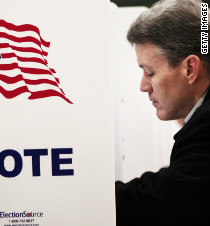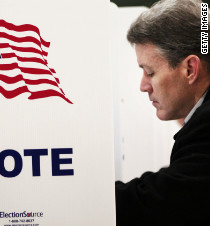What are poll watchers and what are they allowed to do?

(CNN)With early voting underway in a growing number of states and Donald Trump talking about a “rigged” election and warning about what he says will be voter fraud, there have been significant discussions about “poll watchers,” and concerns that certain individuals may try to intimidate their fellow voters.
But what are the rules governing polling places and poll watchers?
As it turns out, the US Constitution gives states the power to regulate the “time, place, and manner” of elections — which means, in practical terms, that most of the rules governing voting and polling places are made at the state level — and can therefore vary widely from one jurisdiction to the next. Indeed, questions like whether you need a photo ID to vote, whether it’s legal to take a “ballot selfie,” or whether you can wear campaign paraphernalia into the voting booth don’t currently have national answers, but instead depend upon each state’s widely varying rules.
Here’s what you need to know:
1) Who/what is a poll watcher and why do states allow them?
The general idea behind poll watchers is that they help promote transparency and openness not through their actions so much as by simply being in the room. Most states (and the District of Columbia) allow at least some kind of observer in polling places, but the rules for how poll watchers are picked (and by whom) vary from state to state. Most importantly, poll watchers are not just individuals who show up at the precinct on Election Day; virtually every jurisdiction requires that official poll watchers be identified and approved in advanceusually at least two weeks beforehand. And to avoid conflicts of interest or the potential for implicit intimidation, most states do not allow otherwise eligible law enforcement officers or state officials to serve as poll watchers.
For example, in Florida, a poll watcher must be a registered voter in the county in which they are observing a polling place. At each polling place, each candidate is entitled to one poll watcher whose application has to be approved in advance by the local supervisor of elections, so both the campaigns and local government officials have a role in identifying the individuals who are allowed to serve as poll watchers.
Requirements vary from state to state. Illinois allows two poll watchers per candidate who are registered voters in the state and not necessarily the local jurisdiction; Missouri’s rules largely resemble Florida’s, except that the poll watchers are chosen by the chair of county committee of each political party; North Carolina is the same, except that poll watchers must also be of “good moral character”; and Pennsylvania allows watchers on behalf of both the candidates and the political parties, so long as the watchers are registered to vote in the same jurisdiction.
2) What are poll watchers allowed to do? What can’t they do?
As the name suggests, poll watchers are generally expected to watch what happens in individual polling places and not play an especially active role in the actual voting process.
Poll watchers generally have two functions: Ensuring that all votes cast in that polling place are counted correctly and reporting suspected irregularities to local officials, be it the poll workers at the polling place, the election board or some other body. This last point is the potential source for controversy, because most states’ laws allow poll watchers to challenge individual voters’ right to vote not directly, but through the poll workers which has provoked concerns about poll watchers trying to intimidate voters.
Poll watchers in Florida are allowed to challenge the identity or right of a person to vote in the county in question so long as they explain their reasons for doing so under oath, and file the challenge with the clerk of the local election board. If the challenge cannot be immediately resolved on site (for example, by verifying that the voter appears on the local election roll), the local election board is then supposed to have the challenged voter cast a “provisional,” rather than “regular” ballot which is usually supposed to be counted once the voter’s right to vote is confirmed. In practice, however, it is often not counted until and unless it might make a difference (for example, as part of a recount in a state in which the final margin is incredibly close). At the same time, Florida law makes it a crime for a poll watcher to file a “frivolous” challenge of any person’s right to vote.
Illinois also allows challenges, but directs that they be resolved on site. If a majority of the local “judges” (usually the poll workers) sustain the challenge, the voter casts a provisional ballot. If the challenge is rejected, the voter casts a regular ballot. Pennsylvania is the same, but, unlike Illinois or Florida, does not have criminal penalties for bad-faith challenges. And Missouri and North Carolina have a similar process except both contemplate that the challenge will be resolved one way or the other on-site, such that the voter will either be removed from the rolls or cast a legal vote.
Most states also allow poll watchers to count the voters and to report to their respective candidate the identities of those who have voted in their precinct. But there’s a distinction between taking names and taking pictures; most states prohibit poll watchers from taking any pictures or making any audio recordings within the polling place.
3) Is this an intimidation technique?
Just about every state forbids poll watchers from any conduct that might tend to intimidate voters including approaching voters and challenging them directly.
Voters are usually allowed to ask poll watchers who they are and who they represent, and in some states, can also ask them for specific kinds of assistance. But if poll watchers have concerns, they must always raise those concerns with the poll workers in the polling place, and not with the voters directly.
The Republican National Committee is currently under a court order prohibiting it from conducting or funding “ballot security” measures that are designed to intimidate minority voters, an order the Democratic National Committee this week asked a court to extend to cover the Trump campaign.
4) Who else should you expect to see at your local polling place?
Every polling place is going to have the actual poll workers, who are, depending upon the jurisdiction, some combination of state employees, temporary contractors or volunteers.
Unlike poll watchers, poll workers are the ones who can help you if you need assistance, who are trained to answer questions, and who have legal authority under state law to confirm a voter’s entitlement to vote and to resolve other challenges made by poll watchers, other voters, or other authorized personnel.
You’ll also see fellow voters (and those who they’re allowed to bring with them to the polling place, including minor children). And you may also see local law enforcement officers or security guards, but their functions are carefully circumscribed on election day as noted above, these personnel are almost always forbidden from playing a direct role in supervising or challenging voters.
And since most polling places are on or near public property, it is of course possible if not likely that there will be vocal supporters of different candidates, members of the media, exit pollsters, and others outside the polling place, although state law bans on “electioneering” usually require some minimum distance between the polling place and these personnel anywhere from 30 to 250 feet. And unlike official poll watchers, individuals outside the polling place have no legal right to challenge a voter’s right to vote.
5) What should you do if a poll watcher or someone else at your polling place acts in a manner that you believe is inappropriate?
The individuals in the best and most immediate position to assist you are the poll workers, who can answer questions you might have, and who are trained to respond to particular types of inappropriate situations.
Every state makes it illegal to intimidate a voter and federal law makes it a crime to intimidate voters or otherwise seek to suppress voting based upon race, color, national origin or religion. For example, an individual’s actions designed to interrupt or intimidate voters at polling places by questioning or challenging them, or by photographing or filming them, under the pretext that these are actions to uncover illegal voting may violate federal voting rights law.
Further, federal law protects the right of voters to mark their own ballot or to be assisted by a person of their choice. Thus, concerns that cannot be adequately resolved by the poll workers can and should be reported to local and/or federal law enforcement officers as soon as possible.
In addition to familiarizing yourself with your state election officials, helpful resources may include the Justice Department’s online form for filing election-related complaints; your local US Attorney’s Office (each of which will have a designated staffer to answer questions and field concerns on Election Day); and the Election Protection Program, run by the Lawyers Committee for Civil Rights, which has a helpful website, along with English (1-866-OUR-VOTE) and Spanish (1-888-VE-Y-VOTA) hotlines for asking questions or reporting Election Day concerns or problems.
6) What about photo IDs, ‘ballot selfies’ and wearing one’s preferred candidate’s attire?
Alas, we can’t answer everything. You should check the rules for your state, but the National Conference of State Legislatures has a helpful guide on the voter ID issue: http://www.ncsl.org/research/elections-and-campaigns/voter-id.aspx. Justin Timberlake spurred a discussion of “ballot selfies”: And the laws concerning whether you can wear supportive attire to vote are an absolute muddle (if you want to try it, it’s probably wise to wear something non-partisan underneath your favorite candidate’s likeness, just in case you’re not allowed to vote without removing the offending item).
But as with everything else these days, your mileage may vary.
Vladeck is a CNN contributor and professor of law at the University of Texas School of Law.
Read more: http://www.cnn.com/2016/10/29/politics/poll-watchers-monitors/index.html
